高考英语语法复习三:名词性从句
高考英语语法必考知识点:名词性从句

高考英语语法必考知识点:名词性从句1什么叫名词性从句从命名法的角度,名词性从句拆开来就是名词性的一个从句。
从句,顾名思义它是从属的成分,它是从属于主句存在的,不能单独存在,就类似于一个家里面一个大人带着一个小孩才能去玩,不能这个小孩自己单独去玩。
名词性顾名思义这个从句它是一个名词性的,就相当于这个从句它就是个名词,那么它在主句中要充当名词能充当的成分。
主句中名词的成分可以是主语、宾语、表语、同位语,所以名词性从句就是用一个句子在主句中充当主语或者宾语或者同位语或者表语的这样的成分,可以简单地记成名词性从句,包括主宾表同四大从句,这个就是名词性从句的本质和功能。
2名词性从句的难点(1)对名词性从句本质的理解和句子结构的划分名词性从句是镶嵌在主句中的,它不像定语从句,定语从句是主句穿了一个马甲,比如主谓宾,然后在主语后面加一个定语从句来修饰这个主语,而名词性从句不一样,它是直接用这个从句去做主句的主语或者做主句的宾语,所以在理解的时候名词性从句是没有办法拿掉的,一定要和主句一起来理解,那么这就是在划分名词性从句结构,分析句子结构的时候的一个难点。
(2)具体的引导词的用法没有办法直接把两个句子合在一起,就不得不说一个句子是从句,这样就一定要有标记词来告诉我们,这个句子是一个从句。
举个例子:我知道他迟到了。
在这句话中,我是主语,知道是谓语。
他迟到了这件事作为宾语。
所以他迟到了就是作为宾语从句。
在英语中不能直接说我知道他迟到了。
而是说我知道that他迟到了。
因为这个that的存在就把他迟到了这件事变成了一个名词性从句的成分,整个句子就相当于是一个名词作主句的宾语。
那么主语从句、表语从句和同位语从句也是一样的道理,需要在这个从句前面加一个引导词来表明这个从句的身份,给他戴个帽子。
所以在学习从句的时候的两个难点,一个是名词性从句,本质的理解,句子结构的划分,而另一个就是具体的引导词的用法,这一个是同学们在学习的时候一定要重点注意的。
高考英语语法填空之名词性从句
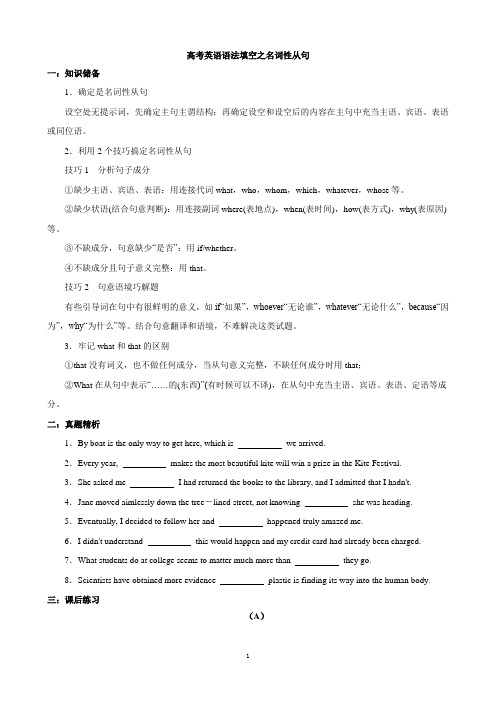
高考英语语法填空之名词性从句一:知识储备1.确定是名词性从句设空处无提示词,先确定主句主谓结构;再确定设空和设空后的内容在主句中充当主语、宾语、表语或同位语。
2.利用2个技巧搞定名词性从句技巧1分析句子成分①缺少主语、宾语、表语:用连接代词what,who,whom,which,whatever,whose等。
②缺少状语(结合句意判断):用连接副词where(表地点),when(表时间),how(表方式),why(表原因)等。
③不缺成分,句意缺少“是否”:用if/whether。
④不缺成分且句子意义完整:用that。
技巧2句意语境巧解题有些引导词在句中有很鲜明的意义,如if“如果”,whoever“无论谁”,whatever“无论什么”,because“因为”,why“为什么”等。
结合句意翻译和语境,不难解决这类试题。
3.牢记what和that的区别①that没有词义,也不做任何成分,当从句意义完整,不缺任何成分时用that;②What在从句中表示“……的(东西)”(有时候可以不译),在从句中充当主语、宾语、表语、定语等成分。
二:真题精析1.By boat is the only way to get here, which is we arrived.2.Every year, makes the most beautiful kite will win a prize in the Kite Festival.3.She asked me I had returned the books to the library, and I admitted that I hadn't.4.Jane moved aimlessly down the tree-lined street, not knowing she was heading.5.Eventually, I decided to follow her and happened truly amazed me.6.I didn't understand this would happen and my credit card had already been charged.7.What students do at college seems to matter much more than they go.8.Scientists have obtained more evidence plastic is finding its way into the human body. 三:课后练习(A)In 1863 the first underground passenger railway in the world opened in London.It ran for just under seven kilometers and allowed people to avoid terrible 1(crowd) on the roads above as they travelled to and 2 work.It took three years to complete and was built using an interesting method.This included digging up the road, 3(lay) the track and then building a strong roof over 4top.When all those had been done,the road surface was replaced.Steam engines 5(use) to pull the carriages and it must have been 6(fair)unpleasant for the passengers,with all the smoke and noise.However,the railway quickly proved to be a great success and within six months,more than 25,000 people were using 7every day.Later,engineers 8(manage) to construct railways in a system of deep tunnels (隧道),which became known as the Tube.This development was only possible with the 9(introduce) of electric-powered engines and lifts.The Central London Railway was one of the most 10(success) of these new lines,and was opened in 1900.It had white-painted tunnels and bright red carriages,and proved extremely popular with the public.(B)My mom was a nurse and often took me along to visit the 1(family) she was caring for,including one who had a series of strokes(中风) and was bedridden.One afternoon Mom told me that we needed to visit the woman 2(give) her medications,and that we would stop at a store 3the way.I thought we would stop at a drugstore,but we pulled up to a shopping mall.My mom 4(head) to the perfume counter and bought the most expensive bottle they offered.She also bought a beautiful nightdress.When I asked her who they were for,she said they were for her patient.She 5 (far) explained although this woman was quite old and bedridden,she was still a lady,and 6old deserved to be treated with respect and grace.When 7(care) for someone,we should look past the disability or the illness and look into the soul of the human,so we can connect them with sympathy.I soon realized that my mom’s greatest 8(strong) was taking care of those who cannot advocate for 9(they) and need trustworthy care providers.Actually,that’s the very reason 10I wanted to become a doctor myself.(C)China is the birthplace of kites.Most people believe they 1(invent) during the Spring and Autumn Period by the famous philosopher Mozi.It is said that he used wood to create a “ 2(fly) bird” that flew in the sky for a whole day.Kites were 3(late) used as military instruments to measure distance,test the wind, aid communication, and rescue people. During the Tang Dynasty, they were used more as a tool for 4(entertain) than a military instrument.At first,only royal family members could play with kites. Later it became popular among commoners who flew them on 5(importance) events and festivals.In the Ming Dynasty, kites were once again used 6military purposes. Many emperors ordered their soldiers to fly kites 7carried explosives.The explosives would fall on the enemy and gave the Chinese a great edge on the battlefield.Nowadays,flying kites has become 8popular form of entertainment and competition.More and more people at home and abroad are fond of flying kites in local or international events 9(show) their kite-making and kite-flying skills.The largest kite museum of the world is in the city of Weifang,10(know) as “Kite Capital of the World”,and every year,kite fans all over the world come to watch and take part in the annual International Kite Festival.。
高考英语语法之名词性从句
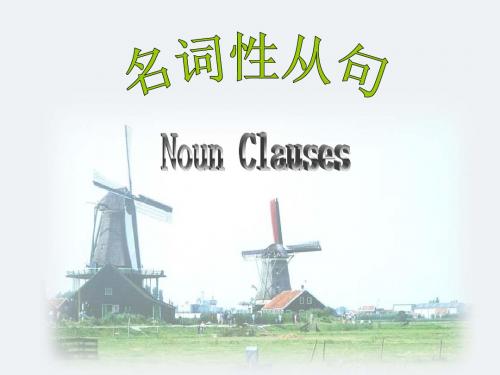
1.名词:表示人或事物的名称的词叫名词。 2.名词的句法作用:名词在句中主要作主语、宾 语、表语和同位语。另外还可以作定语、状语。 3.名词性从句: 在英语的句子结构中,本来该由名词充当的主 语、宾语、表语和同位语,由一个句子来充当, 这个句子就叫名词性从句。 4.名词性从句的种类: 根据名词性从句在句子中所充当的不同成分, 名词性从句可以分为主语从句、宾语从句、表 语从句和同位语从句。
2.When he will go to America is not yet fixed.
(It is not yet fixed when he will go to America.)
宾语从句
在复合句中作主句的宾语.引导 词有连词that (that 常可省 略),whether,if; 代词有who, whose,what ,which
表语从句
在复合句中作主句的表语. 引导词有连词that (that 不可 省),whether; 代词有who, what ,which;
副词 when ,where, how, why
等.
The problem is that we didn’t get in touch with him.
This is how Henry solved the problem. His suggestion is that we (should) finish the work at once.
(4).It is not yet decided which cash crop will be produced next year. (5).Whatever he said was right.
(6).Whoever goes there must get ready by 6 o’clock.
高中英语语法:名词性从句知识汇总

高中英语语法:名词性从句知识汇总在复合句中具有名词的性质的作主语、表语、同位语、宾语的从句叫名词性从句。
因此,我们把主语从句、表语从句、同位语从句和宾语从句这四种从句统称为名词性从句。
当名词性从句要采用陈述句语序。
由一个含疑问意义的连词引起时,必须将该连词放在名词性从句的开头,且该从句语序不能倒装。
一、引导名词性从句的关联词引导名词性从句的关联词大致相同,它们分别是:连词:that, whether, if;关系代词:who, what, which , whom, whose, whatever, whoever, whomever, whichever;关系副词:when, where, how, why, however, whenever, wherever。
引导从句时一般不用逗号和主句分开。
连词that在从句中不作成分,不含疑问意义;而wh-连词在从句中作成分,且含有疑问意义;或what/where从句相当于一个名词后加一个定语从句。
It worried her a bit that her hair was turning grey.她的头发在变白令她有点担忧。
(that在从句中只起引导词作用,不作成分)What caused the accident is still a complete mystery.事故发生的原因仍然是个不解之谜。
(What在从句中作主语)2、that与whether引导名词性从句的区别。
(1)动词doubt表示“怀疑、不知道”解时,肯定句接whether引导的宾语从句;否定句don’t doubt和疑问句Do you doubt要接that引导的从句。
I don’t doubt that he will come soon.我不怀疑他不久会来。
(此处不用whether)Can you doubt that he will win?你怀疑他会赢吗?(此处不用whether)比较:doubt表示“不信”解时,表示强烈的不相信时,在陈述句中可接that从句。
超实用高考英语复习:高考语法填空抢分热点之名词性从句(解析版)
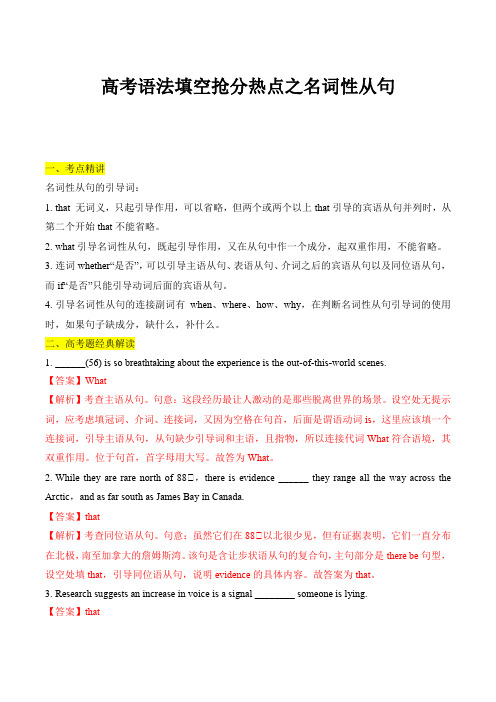
高考语法填空抢分热点之名词性从句一、考点精讲名词性从句的引导词:1.that 无词义,只起引导作用,可以省略,但两个或两个以上that引导的宾语从句并列时,从第二个开始that不能省略。
2.what引导名词性从句,既起引导作用,又在从句中作一个成分,起双重作用,不能省略。
3.连词whether“是否”,可以引导主语从句、表语从句、介词之后的宾语从句以及同位语从句,而if“是否”只能引导动词后面的宾语从句。
4.引导名词性从句的连接副词有when、where、how、why,在判断名词性从句引导词的使用时,如果句子缺成分,缺什么,补什么。
二、高考题经典解读1.______(56) is so breathtaking about the experience is the out-of-this-world scenes.【答案】What【解析】考查主语从句。
句意:这段经历最让人激动的是那些脱离世界的场景。
设空处无提示词,应考虑填冠词、介词、连接词,又因为空格在句首,后面是谓语动词is,这里应该填一个连接词,引导主语从句,从句缺少引导词和主语,且指物,所以连接代词What符合语境,其双重作用。
位于句首,首字母用大写。
故答为What。
2.While they are rare north of 88℃,there is evidence ______ they range all the way across the Arctic,and as far south as James Bay in Canada.【答案】that【解析】考查同位语从句。
句意:虽然它们在88℃以北很少见,但有证据表明,它们一直分布在北极,南至加拿大的詹姆斯湾。
该句是含让步状语从句的复合句,主句部分是there be句型,设空处填that,引导同位语从句,说明evidence的具体内容。
故答案为that。
3.Research suggests an increase in voice is a signal ________ someone is lying.【答案】that【解析】考查同位语从句。
高考英语三大从句(名词性从句、定语从句、状语从句)讲解+练习(附答案)
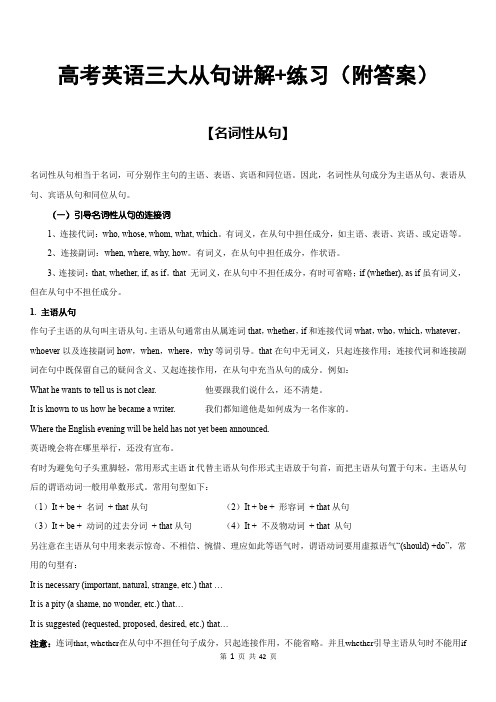
高考英语三大从句讲解+练习(附答案)【名词性从句】名词性从句相当于名词,可分别作主句的主语、表语、宾语和同位语。
因此,名词性从句成分为主语从句、表语从句、宾语从句和同位从句。
(一)引导名词性从句的连接词1、连接代词:who, whose, whom, what, which。
有词义,在从句中担任成分,如主语、表语、宾语、或定语等。
2、连接副词:when, where, why, how。
有词义,在从句中担任成分,作状语。
3、连接词:that, whether, if, as if。
that 无词义,在从句中不担任成分,有时可省略;if (whether), as if虽有词义,但在从句中不担任成分。
1. 主语从句作句子主语的从句叫主语从句。
主语从句通常由从属连词that,whether,if和连接代词what,who,which,whatever,whoever以及连接副词how,when,where,why等词引导。
that在句中无词义,只起连接作用;连接代词和连接副词在句中既保留自己的疑问含义、又起连接作用,在从句中充当从句的成分。
例如:What he wants to tell us is not clear. 他要跟我们说什么,还不清楚。
It is known to us how he became a writer. 我们都知道他是如何成为一名作家的。
Where the English evening will be held has not yet been announced.英语晚会将在哪里举行,还没有宣布。
有时为避免句子头重脚轻,常用形式主语it代替主语从句作形式主语放于句首,而把主语从句置于句末。
主语从句后的谓语动词一般用单数形式。
常用句型如下:(1)It + be + 名词+ that从句(2)It + be + 形容词+ that从句(3)It + be + 动词的过去分词+ that从句(4)It + 不及物动词+ that 从句另注意在主语从句中用来表示惊奇、不相信、惋惜、理应如此等语气时,谓语动词要用虚拟语气“(should) +do”,常用的句型有:It is necessary (important, natural, strange, etc.) that …It is a pity (a shame, no wonder, etc.) that…It is suggested (requested, proposed, desired, etc.) that…注意:连词that, whether在从句中不担任句子成分,只起连接作用,不能省略。
高中英语2025届高考语法复习名词性从句知识讲解练习

高考英语语法复习名词性从句讲解练习名词性从句是指在复合句中起名词作用的句子,功能相当于名词词组。
名词性从句在复合句中能作主语、宾语、表语、同位语等,根据在句中的语法功能可分为主语从句、宾语从句、表语从句和同位语从句。
一、主语从句【定义】在复合句中,作主语的句子称为主语从句。
【常见的连接词】(连接词在句中不能省略)that, whether, who, what, whatever, whoever, where, when, why, how等。
【用法】连接词 that 引导That we should learn English well is very important.主语从句中 we should learn English well句子完整,不缺成分,用that引导,that 不能省连接词whether,if 引导whether 引导的主语从句可放句首,也可放句中,表“是否”if 引导的主语从句只能引导动词后的宾语Whether I will go or not depend on the weather.It remains to be seen whether / if they can finish the task in time.2.连接代词what, who, which, whose, whatever, whichever,whoever等引导What matters most is your attitude.3.连接副词when,where,why,how等引导How he made it is still unknown.4.it作形式主语为了避免句子头重脚轻,通常把形式主语it放在句首,真正的主语放在句子后面。
常见句型:(1) It is + n.+ that + 句子It is +(a pity / a shame / a fact …)+ that ...(2) It is + adj.+ that + 句子It is +(true / clear / important …)+ that ...(3) It is + 过去分词 + that + 句子It is+ said / announced / expected / believed / hoped… + that ...(4) It seems /appears / happens / turned out that + 句子(5) It hit sb./occurred to sb.that + 句子二、宾语从句【定义】在复合句中,作宾语的句子称为宾语从句。
高考英语语法复习——名词性从句

•
• • •
5. (08,北京卷)The companies are working together to create _____ they hope will be the best means of transport in the 21th century.
A. which B. that C. what D. who 6.(06,全国卷)See the flags on top of the building? That was _____ we did this morning. A. when B. which C. where D. what
(1) that从句放在句首时,连词that是绝对不能省略的。例如 It’s a pity (that) you’re leaving.
•
• • •
That he passed the exam made his parents pleased.
(2) that从句一般都不能充当介词的宾语, 但 except that in that 除外。 例如: He is a good student except that he is a little bit careless. Human beings are different from animals in that they can use language.
•
•
4. (09四川卷,7) News came from the school office ____ Wang Lin had been admitted to Beijing University.
A. which B. what C. that D. where
•
语法复习3: 名词性从句(修订)

高三英语专题复习要点回顾与精练专题04 名词性从句一【语境检测】用适当的连接词、连接代词或链接副词填空使得文章的语意通顺完整。
Light’s Many Colors多彩的光1_______white light is made up of different colors was proved through Newton’s work.The English scientist, Isaac Newton (1643-1727), did a lot of experiments to study light. 2________interested him was the color of light. 3_______light is “white”or “colorful”was still unknown to the people of his time. Few doubted the common knowledge 4_______white light was “pure” light without colors.The question is 5_______he did the experiment. It is quite simple. He allowed a beam of light to pass through a piece of triangular(三角形) glass and then fall on a white wall.6_______he saw on the wall was a band of colors: red, orange, yellow, green, blue, indigo and violet. Were the colors produced by the glass? NO. When Newton passed the light that had come out of the triangular glass through a second triangular glass, all he got was white light.7_______light is colorful was still a question. However, 8_______the colors came from was answered through the experiment. It is certain9_______the colors of light are from the light itself, not form the glass or anything else. The experiment showed 10_______ light had to be looked upon in a new way. Man need to learn more about light.1.That2.what3.Whether4. That5.how6.What7.Why8.where9.that 10.that二【知识导图】三、名词性从句常用关联词的选择三、易混淆的引导词的区别类别说明what与that的区别(见考题1,2)what作复合关系代词并表示“所……的(东西)”之意,相当于“the +名词+ that /which”或“all that”,可指代不确定的事物,在从句中作主语、宾语或表语;而that在名词性从句中只起引导作用,不表达任何意思。
高考英语名词性从句专题(精辟)
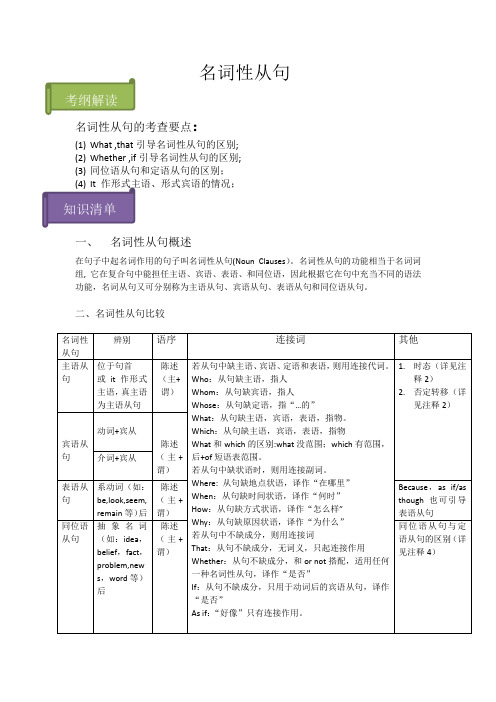
名词性从句的考查要点:(1) What ,that 引导名词性从句的区别; (2) Whether ,if 引导名词性从句的区别; (3) 同位语从句和定语从句的区别; 一、 名词性从句概述在句子中起名词作用的句子叫名词性从句(Noun Clauses )。
名词性从句的功能相当于名词词组, 它在复合句中能担任主语、宾语、表语、和同位语,因此根据它在句中充当不同的语法功能,名词从句又可分别称为主语从句、宾语从句、表语从句和同位语从句。
二、名词性从句比较请注意1、名词性从句中的that 省略情况:动词后的宾语从句和表语从句中的that 可以省略。
2、No matter +wh-开头的词如no matter what 等只能连接让步状语从句。
而wh-开头的词+ever 如whatever 等既能连接让步状语从句,也能连接名词性从句。
解题步骤和原则:分析复合句结构,找出从句,确定名词性从句中的哪一类。
分析从句,结合上表中各个连接词的特点,缺什么补什么。
主语从句中It 作形式主语常用句型:1.It + be +形容词(obvious, true, natural, possible, likely, probable, certain, wonderful, good, etc.) + that 从句2. It + be +名词词组(no wonder ,a pity ,an honor, a good thing, no surprise , etc.) + that 从句3. It + be + 过去分词(said, thought, reported, expected, announced, decided , etc.) + that 从句4. It +不及物动词(seem, happen, etc.) + that 从句5. It doesn ’t matter(make no different , etc.) + 连接代词或连接副词引导的主语从句Eg: It is certainthat she will do well in her exam. Eg1.(2012课标·全国I) It is by no means clear__________ thepresident can do to end the strike.A.howB. whichC. thatD. what2.(2012天津,7)It doesn’t matter _______you turn right or left at the crossing — both roads lead to the park.A. whetherB. howC. ifD. when3.(2012江西,25) It suddenly occurred to him_________ he had left his keys in the office.A. whetherB. whereC. whichD. that1. if /whether表示“是否” 可以互换,但以下情况只能用whether,不用if. (1)在介词后面Eg:Everything depends on whether we have enough time.(2)与or not连用Eg:I don’t know whether he will come or not.(3)宾语从句提前时Eg:whether they can come here on time, we don’t know.(4)后面跟不定式Eg:I really don’t know whether to accept or refuse.2. 宾语从句的时态(一般来说,主从句时态要统一。
高考英语一轮复习——名词性从句(附答案)
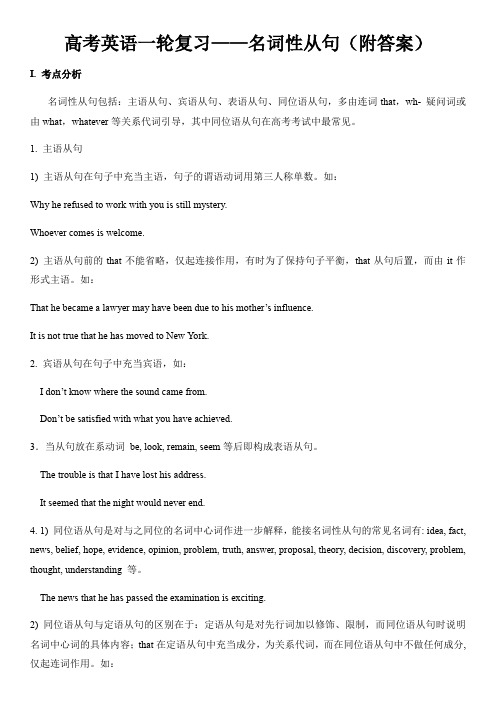
高考英语一轮复习——名词性从句(附答案)I. 考点分析名词性从句包括:主语从句、宾语从句、表语从句、同位语从句,多由连词that,wh- 疑问词或由what,whatever等关系代词引导,其中同位语从句在高考考试中最常见。
1. 主语从句1) 主语从句在句子中充当主语,句子的谓语动词用第三人称单数。
如:Why he refused to work with you is still mystery.Whoever comes is welcome.2) 主语从句前的that不能省略,仅起连接作用,有时为了保持句子平衡,that从句后置,而由it作形式主语。
如:That he became a lawyer may have been due to his mother’s influence.It is not true that he has moved to New York.2. 宾语从句在句子中充当宾语,如:I don’t know where the sound came from.Don’t be satisfied with what you have achieved.3.当从句放在系动词be, look, remain, seem等后即构成表语从句。
The trouble is that I have lost his address.It seemed that the night would never end.4. 1) 同位语从句是对与之同位的名词中心词作进一步解释,能接名词性从句的常见名词有: idea, fact, news, belief, hope, evidence, opinion, problem, truth, answer, proposal, theory, decision, discovery, problem, thought, understanding 等。
高考英语一轮复习(语法)-名词性从句

高考英语一轮复习(语法)——名词性从句名词性从句包括:主语从句、表语从句、宾语从句和同位语从句。
引导名词性从句的连词有:A.连词:that, whether, if(这三个词都不作从句的成分,同时,that无含义,而whether和if都表“是否”)B.疑问代词:who, whom, whose, what, whichC.疑问副词:when, where, why, how(一)主语从句在复合句中充当主语的从句。
1.that引导主语从句that引导主语从句时不同于其他的连词,既无词义也不作成分,只起单纯的连接作用,且通常不可以省。
为了强调that引导的主语从句而置之于句首时,that不可省。
①That the driver could not control his car was obvious.②That she was chosen made us very happy.③That he will come is certain.④That he would take the risk is true.⑤That he should have married her isn't surprising.★通常,that引导主语从句时用it做形式主语,把从句置于句尾,此时that 有时可省。
例如:①It was obvious that the driver could not control his car.②It made us very happy that she was chosen.③It is certain that he will come.④It is true that he would take the risk.⑤It isn't surprising (that) he should have married her.★如果以that从句为主语的句子是疑问句,就只能用先行词it结构。
2020高考英语语法专题汇总(三):名词性从句
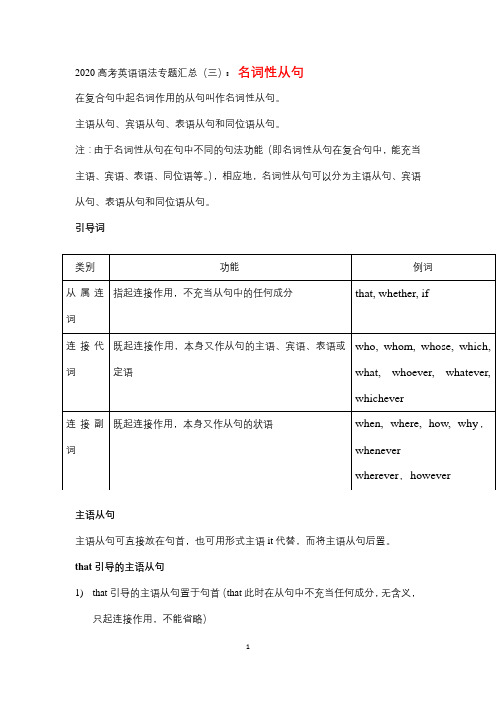
2020高考英语语法专题汇总(三):名词性从句在复合句中起名词作用的从句叫作名词性从句。
主语从句、宾语从句、表语从句和同位语从句。
注:由于名词性从句在句中不同的句法功能(即名词性从句在复合句中,能充当主语、宾语、表语、同位语等。
),相应地,名词性从句可以分为主语从句、宾语从句、表语从句和同位语从句。
引导词主语从句主语从句可直接放在句首,也可用形式主语it代替,而将主语从句后置。
that引导的主语从句1)that引导的主语从句置于句首(that此时在从句中不充当任何成分,无含义,只起连接作用,不能省略)That the earth moves around the sun is known to all.注:从句作主语,谓语动词用单数形式。
2)在that引导的主语从句中,常用it作形式主语,that引导的真正的主语从句后置,常见的此类句型有:①It+系动词+形容词+that从句。
常用于这种结构的形容词有:It is likely that he can’t come to the meeting.It is obvious that you have made a big mistake.It is necessary /important /surprising /strange /unthinkable /unbelievable incredible that+主语(should)+动词原形+其它。
It is necessary that a college student (should) master one or two foreign languages.It is strange that you (should) trust Jane.②It+系动词+名词+that从句。
常用于这种结构的名词有:It is a pity that you didn’t attend the lecture yesterday.I t is no wonder that you’ve achieved so much success.③It+ be+过去分词+that从句。
高三英语语法复习(名词性从句)

表语从句
表语从句在复合句中作表语,位于系动词之 后。 The question was who could go there. 表语
表语从句考点
1.句子的主语是suggestion, advice, order等名词时, 后面引导的表语从句用should+动词原形,should可 省略。【虚拟语气】 His suggestion is that we (should) finish the work at once. 2.定语从句+表语从句 The reason why he is absent today is that he is ill. 3.主语从句+表语从句 What is known to all is that the earth is round. 4. if 不能用在表语从句中,而是用whether。 The question was whether he could go there.
2.句子的谓语是suggest, advise, order等动词 时,后面引导的宾语从句用should+动词原 形,should可省略。【虚拟语气】
坚持 命令 建议 要求 insist order command suggest advise recommend desire, demand, request, require
同位语从句考点
1.如果名词suggestion, advice, order等词后 的同位语从句的谓语动词要用should+动词 原形,should可省略。 The suggestion that the plan (should) be delayed will be discussed tomorrow. 2. if 不能用在同位语从句中,而是用whether。 The question whether he could go there was important.
高考英语语法复习之名词性从句
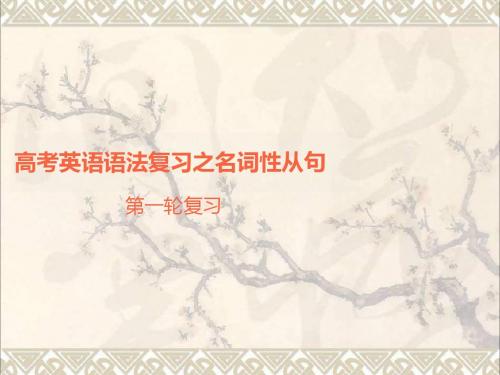
3 . 宾语从句 I hope (that) everything is all right.
that 引导的宾语从句之注意:
(1)that在引导宾语从句时,常可省略,但如果有两 个以上的宾语从句时,最后一个从句的that不能 省略。如: I know (that) he has just graduated from college and that he is looking for a job.
状语
①When he will go is unknown. ②I wonder why he tried to avoid me. ③This room is where I was born. ④This is how we work.
①Pay attention to what the teacher said. ②Who kept the door open all night was unknown.
whomeve 主语、宾语 r 无论谁/ 无论哪个( 、表语、定 / which 些)/无论什么 语 ever/ whatever
整“呼应”。如:
She remembered that she had left her wallet at
the school gate.
Our teacher said that light travels faster than
sound.
4.
同位语从句
同位语从句在句中作某一名词的同位语,一般位
于该名词(如:news, fact, idea, suggestion,
promise等)之后,说明该名词的具体内容。如:
I have no idea when he will be back.
高考英语语法复习精品资料汇总:名词性从句
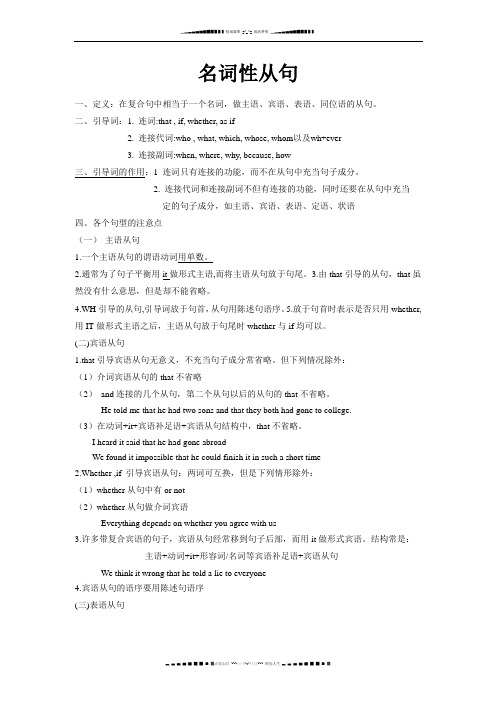
名词性从句一、定义:在复合句中相当于一个名词,做主语、宾语、表语、同位语的从句。
二、引导词:1. 连词:that , if, whether, as if2. 连接代词:who , what, which, whose, whom以及wh+ever3. 连接副词:when, where, why, because, how三、引导词的作用:1 连词只有连接的功能,而不在从句中充当句子成分。
2. 连接代词和连接副词不但有连接的功能,同时还要在从句中充当定的句子成分,如主语、宾语、表语、定语、状语四、各个句型的注意点(一)主语从句1.一个主语从句的谓语动词用单数。
2.通常为了句子平衡用it做形式主语,而将主语从句放于句尾。
3.由that引导的从句,that虽然没有什么意思,但是却不能省略。
4.WH引导的从句,引导词放于句首,从句用陈述句语序。
5.放于句首时表示是否只用whether, 用IT做形式主语之后,主语从句放于句尾时whether与if均可以。
(二)宾语从句1.that引导宾语从句无意义,不充当句子成分常省略。
但下列情况除外:(1)介词宾语从句的that不省略(2)and连接的几个从句,第二个从句以后的从句的that不省略。
He told me that he had two sons and that they both had gone to college.(3)在动词+it+宾语补足语+宾语从句结构中,that不省略。
I heard it said that he had gone abroadWe found it impossible that he could finish it in such a short time2.Whether ,if 引导宾语从句:两词可互换,但是下列情形除外:(1)whether从句中有or not(2)whether从句做介词宾语Everything depends on whether you agree with us3.许多带复合宾语的句子,宾语从句经常移到句子后部,而用it做形式宾语。
高考英语语法复习:名词性从句
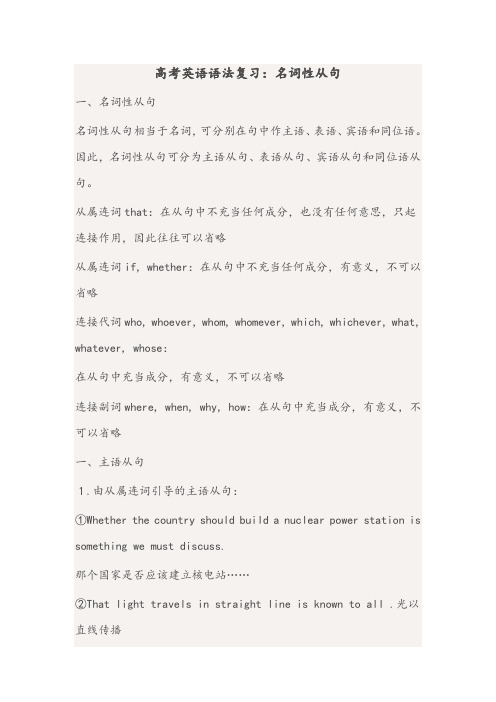
高考英语语法复习:名词性从句一、名词性从句名词性从句相当于名词,可分别在句中作主语、表语、宾语和同位语。
因此,名词性从句可分为主语从句、表语从句、宾语从句和同位语从句。
从属连词that:在从句中不充当任何成分,也没有任何意思,只起连接作用,因此往往可以省略从属连词if, whether:在从句中不充当任何成分,有意义,不可以省略连接代词who, whoever, whom, whomever, which, whichever, what, whatever, whose:在从句中充当成分,有意义,不可以省略连接副词where, when, why, how:在从句中充当成分,有意义,不可以省略一、主语从句1.由从属连词引导的主语从句:①Whether the country should build a nuclear power station is something we must discuss.那个国家是否应该建立核电站……②That light travels in straight line is known to all .光以直线传播2.由连接代词引导的主语从句:①What we need is more time. 我们所需要的是……②Whichever book you choose doesn’t matter to me.无论你选哪本书……③Whoever comes will be welcome.无论谁来……3.由连接副词引导的主语从句:①When the plane is to take off hasn’t been announced.飞机什么时候起飞……②Where he has been is still a puzzle.他到过哪儿……③How much water is flowing can be measured easily.水的流量是多少……4.关于形式主语it①It + be +形容词+ that-从句It is necessary that…有必要……It is important that…重要的是……It is obvious that…很明显……It is likely that….很可能②It + be + -ed 分词+ that-从句It is believed that…人们相信……It is knownto all that…众所周知……It has been decided that…已决定……③It + be +名词+ that-从句It is common knowledge that………是常识It is a surprise that…令人惊奇的是……It is a fact that…事实是……可应用于此句型的名词还有fact / shame / honor / question/pity等。
高考英语语法专题汇总(三):名词性从句(附例题及电子版)
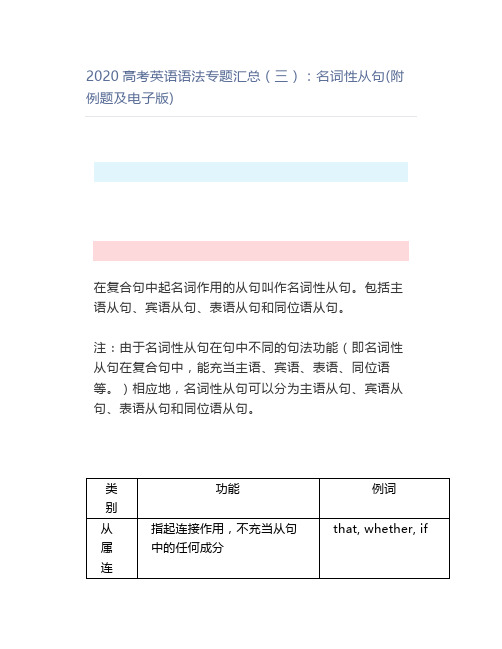
2020高考英语语法专题汇总(三):名词性从句(附例题及电子版)在复合句中起名词作用的从句叫作名词性从句。
包括主语从句、宾语从句、表语从句和同位语从句。
注:由于名词性从句在句中不同的句法功能(即名词性从句在复合句中,能充当主语、宾语、表语、同位语等。
)相应地,名词性从句可以分为主语从句、宾语从句、表语从句和同位语从句。
2主语从句主语从句可直接放在句首,也可用形式主语it代替,而将主语从句后置。
•that引导的主语从句1)that引导的主语从句置于句首(that此时在从句中不充当任何成分,无含义,只起连接作用,不能省略)That the earth moves around the sun is known to all.注:从句作主语,谓语动词用单数形式。
2)在that引导的主语从句中,常用it作形式主语,that引导的真正的主语从句后置,常见的此类句型有:①It+系动词+形容词+that从句。
常用于这种结构的形容词有:It is likely that he can’t come to the meeting.It is obvious that you have made a big mistake.注:It isnecessary/important/surprising/strange/unthin kable/unbelievable/incredible that+主语(should)+动词原形+其它。
例:It is necessary that a college student (should) master one or two foreign languages.It is strange that you (should) trust Jane.②It+系动词+名词+that从句。
常用于这种结构的名词有:It is a pity that you didn’t attend the lecture yesterday.It is no wonder that you’ve achieved so much success.③It+ be+过去分词+that从句。
- 1、下载文档前请自行甄别文档内容的完整性,平台不提供额外的编辑、内容补充、找答案等附加服务。
- 2、"仅部分预览"的文档,不可在线预览部分如存在完整性等问题,可反馈申请退款(可完整预览的文档不适用该条件!)。
- 3、如文档侵犯您的权益,请联系客服反馈,我们会尽快为您处理(人工客服工作时间:9:00-18:30)。
高考英语语法复习三:名词性从句名词性从句相当于名词,可分别作主句的主语、表语、宾语和同位语。
因此,名词性从句可分为主语从句、表语从句、宾语从句和同位从句。
(一引导名词性从句的连接词1、连接代词:who, whose, whom, what, which。
有词义,在从句中担任成分,如主语、表语、宾语、或定语等。
2、连接副词:when, where, why, how。
有词义,在从句中担任成分,作状语。
3、连接词:that, whether, if, as if。
that 无词义,在从句中不担任成分,有时可省略; if (whether, as if虽有词义,但在从句中不担任成分。
注意:连接代词与连接副词在句中不再是疑问句,因而从句中谓语不用疑问式。
连接代词与连接副词在从句充当句子成分,连接词whether 和if(是否,as if(好象在从句中不充当句子成分,只起连接作用。
根据句义,如果连接代词与连接副词,whether、if 和as if 都用不上时,才用that作连接词(that本身无任何含义。
(二主语从句1、主语从句在复合句作主语。
e.g. Who will go is not important.2、用it作形式主语,主语从句放在句末。
e.g. It doesn't matter so much whether you will come or not.3、that引导主语从句时,不能省略。
e.g. That he suddenly fell ill last week made us surprised.(三表语从句1、表语从句在复合句中作表语,位于系动词之后。
e.g. The question was who could go there.2、引导表语从句的连接词that有时可省去。
e.g. My idea is (that we can get more comrades to help in the work.(四宾语从句1、宾语从句在复合句中作宾语。
引导宾语从句的连词that一般可省略。
e.g. I hope (that everything is all right.2、介词之后的宾语从句,不可用which或if连接,要分别用what或whether。
e.g. I'm interested in whether you've finished the work..I'm interested in what you've said.3、whether与if都可以引导宾语从句,常可互换。
但下面情况不能互换。
①宾语从句是否定句时,只用if,不用whether。
e.g. I wonder if it doesn't rain.②用if 会引起误解,就要用whether。
e.g. Please let me know whether you want to go.(此句如果把whether改成if,容易当成条件句理解③宾语从句中的whether 与or not直接连用,就不能换成if;不直接连用,可换。
e.g. I don't know whether or not the report is true.I don't know whether/ if the report is true or not.④介词后的宾语从句要用whether引导。
whether 可与不定式连用。
whether也可引导主语从句、表语从句、同位语从句,还可引导让步状语从句,以上均不能换成if。
但引导条件从句时,只能用if,而不能用whether。
e.g. It depends on whether we have enough time.They don't know whether to go there.Please come to see me if you have time.(五同位语从句同位语从句在句中作某一名词的同位语,一般位于该名词(如:news, fact, idea, suggestion, promise等之后,说明该名词的具体内容。
e.g. I have no idea when he will be back.The fact that he had not said anything surprised everybody.练习:名词性从句一、判断下列各句哪句含有名词性从句,并指出是什么从句:1. China is no longer what it used to be.2. The truth that the earth turn around the sun is known to all.3. It was snowing when he arrived at the station.4. How he persuaded the manager to change the plan is interesting to us all.5. The news that they had won the game soon spread over the whole school.6. The news that you told me yesterday was really disappointing.7. That is where Lu Xun used to live.8. He spoke as if he understood what he was talking about.9. Do you remember the teacher who taught us English at middle school?10. I wonder why she refused my invitation.二、用适当的连词填空:1. I can't decide ____________ dictionary I should buy.2. That's ____________ he refused my invitation.3. I am very interested in ____________ he has improved his pronunciation in such a short time.4. ____________ we need is more time.5. The fact ____________ she had not said anything at the meeting surprised everybody.6. ____________ and ____________ they will meet has not been decided yet.7. Please tell me ____________ you are waiting for.8. Is that ____________ you are looking for?9. Would you please tell me ____________ the nearest post office is?10. I don't know ____________ he will agree to the plan or not.三、选择填空:1. Do you see _____ I mean?A. thatB./C. howD. what2. Tell me_____ is on your mind.A. thatB. whatC. whichD. why3. We must stick to _____ we have agreed on.A. whatB. thatC. /D. how4. Let me see _____.A. that can I repair the radioB. whether -I can repair the radioC. I can repair the radioD. whether can I repair the radio5. Keep in mind _____.A. that the teacher saidB. what did the teacher sayC. that did the teacher sayD. what the teacher said6. Could you advise me _____?A. which book should I read firstB. what book should I read firstC. that book 1 should read firstD. which book I should read first7. He was criticized for _____.A. he had done itB. what he had doneC. what had he doneD. that he had done it8. Would you kindly tell me _____?A. how can I get to the Beijing Railway StationB. how I can get to the Beijing Railway StationC. where can I get to the Beijing Railway StationD. whether can I get to the Beijing Railway Station9. Mrs. Smith was very much impressed by _____.A. what had she seen in ChinaB. that she had seen in ChinaC. what she had seen in ChinaD. which had she seen in China10. We took it for granted ___A. that they were not comingB. that were they not comingC. they were coming notD. were they not coining11. I really don't know _____A. I should do nextB. what should I do nextC. what I should do nextD. how I should do next12. I'm afraid _____.A. the little girl will have to be operated onB. that will the little girl have to operate onC. the little girl will have to operate onD. that will the little girl have to be operated on13. She walked up to _____ .A. where did I standB. where I stoodC. I stood thereD. where I stood there14. Can you tell me _____?A. who is that gentlemanB. that gentleman is whoC. who that gentleman isD. whom .is that gentleman15. We'll give you _____.A. that do you needB. what do you needC. whatever you needD. whether do you need16. They want us to know _____ to help us.A. what can theyB. what they canC. how they canD. how can they17. We must put _____ into practice.A. what we have learnedB. that we have learnedC. that have we learnedD. what have we learned18. Did she say anything about _____?A. that the work was to be doneB. how was the work to be doneC. that was the work to be doneD. how the work was to be done19. He was never satisfied with _____.A. what she had achievedB. had what she achievedC. she had achievedD. that she achieved20. These photographs will show you _____.A. what does our village look likeB. what our village looks likeC. how does our village look likeD. how our village looks like21. Peter insisted _____ he pay the bill.A. on thatB. whatC. thatD. on which22. They urged _____ the library open during the vacation.A. whenB. whereC. whyD. that23. We wish we could have learned _____ when we were at high school.A. what you didB. that you had doneC. that what you didD. what did you do24.1 will describe to you _____ I saw when there.A. whatB. thatC. whichD./25. From _____ I should say he is a good worker.A. what 1 know of himB. that I do know of himC. what do I know of himD. that do I know of him26. I will give this dictionary to __ wants to have it. A. whomever B. anyone C. whoeverD. someone 27._____ they will come here hasn' t been decided yet. A. What B. That C. When D. Where 28. _____ was said here must be kept secret. A. Who B. The thing C. Whatever D. Where 29. It is still a question _____ we shall have our sports meet. A. if B. that C. what D. when 30. I'm going anyway. _____ she will go is up to her to decide. A.If or not B. Whether or not C. If D. That 31. It is strange _____ she have left without saying a word. A. that B. what C. why D. how 32. It is very clear _____ our policy is a correct one. A. what B. that C. why D. where 33. _____ Mr. Zhang said is quite right. A. That B. When C. What D. Whether 34. It has been decided _____ he will be sent there. A. if B. whether C. why D. that 35. It doesn' t matter _____he' s come back or not. A. if B. whether C. that D. when 36. It's a great pity _____ we won't be able to finish the task on time. A. when B. that C. why D. where 37. It happened _____ I wasn't there that day. A. when B. why C. where D. that 38._____ you have done might do harm to other people. A. What B. That C. Which D. The things 39. _____ leaves the room last ought to turn oft the lights. A. Anyone B. The person C. Whoever D. Who 40._____ the 2000 Olympic Games won't be held in Beijing is known to all. A. Whether B. If C. Whenever D. That41. _____ fails to see this will make a big mistake. A. That B. Whoever C. Whether D. Whether or not 42. __ we need more equipment is quite obvious. A. What B. Whether C. That D. Whatever 43. Has it been announced _____? A. when are the planes to take off B. that are the planes to take off C. where are the planes to take off D. when the planes are to take off 44. That is _____ we all support his idea. A. what B. why C. where D. when 45.That's _____ we should do. A. that B. what C. how D. why 46. _____ is troubling me is _____ I don't understand _____ he said A. What; that; what B. What; what; what C. That; that; what D. Why; that; which 47. Things were not _____ they seemed to be. A. when B. why C. that D. what 48. That's _____ I want to say. A. all what B. what C. all which D. what that 49. That's _____ . A. where our differences lie B. our differences lie there C. where do our differences lie D. that where our differences lie 50. That is _____ . A. where lived he there B. where did he live C. where he lived D. that where he lived 51. The questions is _____. A. whether is it worth doing B. that if it is worth doing C. whether it is worth doing D. if it is worth doing 52. Water will continue to be _____ it is today next in importance to oxygen. A. how B. which C. what D. as 53. That's_____. A. how did I become a teacher B. how I became a teacher C. how a teacher I became D. that I became a teacher 54. They are just _____. A. that what shall I have B. what shall I have C. that I shall have what D. what I shall have 55. It looked ____. A. as if it was going to rain B. that as if it was going to rain C. as if was it going to rain D. as if that it was going to rain 56. That's_____. A. how she did it B. that how did she do it. C. how did she do it D. what she did it 57. That is _____ we decided to put the discussion off. A. where B. which C. that D. why 58. That's _____ I lived when I was ten years old. A. where B. at which C. there where D. when 59. My suggestion is _____ we should send a few comrades to help them. A. if B. that C. when that D. that where 60. The idea _____ all people are selfish is wrong. A. what B. that C. why D. if 61. We heard the news _____ our team had won. A. that B. what C. whether D. why 62. The fact _____ he hadn't said anything surprised us all. A. why B. if C. that D. whether 63.I have no idea _____ shewill be back. A. that B. where C. that when D. when 64. We must keep in mind the fact_____ China is still a developing country. A. whether B. that C. why D. when 65. They have no idea at all _____. A. where he has gone B. where did he go C. where has he gone D. which place he has gone答案:一、1、表语从句;2、同位语从句;3、不是;4、主语从句;5、同位语从句;6、不是; 7、表语从句;8、宾语从句;9、不是;10、宾语从句二、1. which;2. why;3. how;4. What;5. that;6. when, where;7. who(m;8. what;9. where; 10. whether 三、1~5 DBABD 6~10 DBBCA 11~15 CABCC 16~20 BADAB 21~25 CDAAA 26~30 CCCDB 31~35 ABCDB 36~40 BDACD 41~45 BCDBB 46~50 ADBAC 51~55 CCBDA 56~60 ADABB 61~65 ACDBA。
